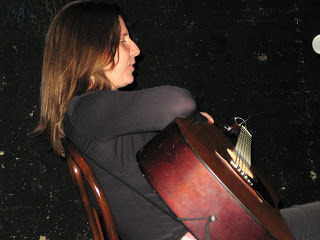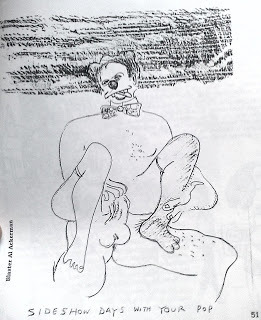Rupert Wondolowski's Blog, page 6
April 25, 2013
Where To From Out - Into Chris Mason's Mind, Of Course
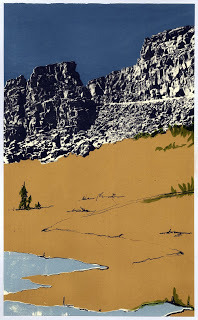
Where To From Out by Chris Mason
Furniture Press Books, 2013
furniturepressbooks.com
furniture.press.books@gmail.com
Where To From Out, Chris Mason's latest charming, informative and deeply human and humane book, is his autobiography through his life's travels. What better way to know a person and their values than through where they go, who they go with and what they bring back with them?
The primary focus of these journeys, though, is the grandeur of the lands and peoples of Earth and their history. The author recognizes he is lucky enough to be a relatively brief specimen passing through with a respect and awe of the human continuum and, like in "Gondwanaland Super-continet Earth 450 million years ago", a concern for the future: "...The/ current mass/ extinction being/ caused by us/ is happening so/ slowly we/ hardly notice it." To move about informed by the history of the lands we travel is a political act and the first and best protection against acting like an Assclown.
Befitting the travel poems inside, the chapbook is designed like a map or a cool menu that you would get at a rustic tavern on a Swiss hillside. The limited edition version, which I am happy to be holding, has beautiful textured screen printed covers by Jodi Hoover.
To give an example of the populist vision of Chris, one similar to folk legend Woody Guthrie, here are a few lines from "Monteverde, Costa Rica":
........Cloud
forest life,
suspended between
ground and sky,
thick air and algae -
dwelling sloth
fur. Costa Rica's
land became
richer when lack of
gold there caused
Conquistadors to
go elsewhere.

The format of the book being so long and thin (about 2 1/2" wide & 13" tall), the line breaks are short and clipped, giving the writing the feel of notes and impressions jotted down on the fly or resting at a cafe, to be assembled and pondered when you return home.
The various homes throughout stages of the author's life are also sprinkled among the travel destinations. Like he and his wife's home ("Halethorpe, Maryland, 1988") with a small Jewish cemetary behind it that they move into with their newborn daughter.
Despite its drawbacks: "smelly polluted gully", "Jewish/cemetery, one/ night defaced,/", plus Winky the blind cat they took in accidentally getting cooked in a propane furnace, the author has a warm spot in his heart for their marriage cottage where their toddler danced to music tapes - "I heart/ambient/haunted love-hovel". I must disclose (and brag) that I too heart that place and of course Chris. I got to help him move in there and watch redheaded wild sprite Elizabeth take form and grow resilient.
To get a rich feeling for the author's own origins, an awful lot is packed into the small 11 line poem "Oberammergau, Germany, (Reenactment of Christ's Crucifixion) Every Tenth year":
17, living
in Oxford
with parents, night brain
storm, knock on
bedroom door, their sweet
marital
embrace, open door,
shout, "Let's go
see the Passion Plays
this Spring at
Oberammergau!"
You get a lot of insight from these few lines/words - the 17 year old not only has worldly intellectual curiosity outside average teen stuff, but his relationship is such with his parents that they not only share intellectual passions, but he feels comfortable enough to knock on their closed night door. The warmth of the home is only further accentuated by the fact that he has interrupted them getting it on (hopefully the interruptions were not a regular occurrence. That would take this narrative into a far different place).
But of course no human is just a gusher of light wanting to hang with the folks while Christ is strung up again, there has to also be a dark side. Or else Jung would purely just be read by anally fixated pastel New Agers carefully weighing their daily stools in Whole Foods.
In "Kindergarten Room Keewaydin Elementary School Minneapolis, Minnesota" we learn: "I sneak up on/ gentle big/ brother John skating/ and push him/ face first down on ice./ Teacher mad/ sixth grade when we move/ I don't thank/ class for completing/ my paper/ mache yarn monkey."

A major theme in this book that to me runs throughout all of Chris' work, is that though our personal material lives are finite, they're infinite in their resonance in the cycle of life. We live on in the hearts and minds of our loved ones, bones of a three foot tall human from 17 thousand years ago are dug up in Indonesia for scientists to learn from, "Some guys drink beer, see/ cosmic rays/ making Northern Lights./ Maybe those/ muons are from that/ binary/ star, Cygnus X- 3,/ one guy thinks."
And where is the great circle of life better represented than by a book in a bookstore? In "Normals Books and Records" (okay, I co-own this shop, but that's not the only or main reason I'm quoting from here), things get downright meta. The author is filling in for his bookshop pal who claims to be going to the post office but is most likely out fiendishly sucking down a shorty behind the Save-Rite. While there Chris comes across one of the books he wrote and gave away to a woman he had a crush on sitting in the store with his inscription to her on a continent of feeling long long ago. "Coffee stains,/ finger-smude, corners/ of pages/ curling, spine bloated/ or spine cracked,/ books sent out come back/ older." Another time in the same store he hears the daughter of the director of the Bach society from his hometown in Minneapolis that his mother sang in plaing electronically altered flute, "their notes in moonlight now dispersed./ Each book on shelf at/ Normals once/ lay open, face down,/ on someone's/ stomach, half-asleep,/ half-mouthing/ words just read to self."
Now Where To From Out, Chris' new book, is standing beautiful and filled with whimsy and wisdom on the bookshelves of that very store and I am confident that many years from now when the Earth is ruled by "a great though now/ obscure phylum of/ beings with/ unlikely object-/ perceivers,/ unthinkable thing-/ controllers/ and thoughts that do not/ seem like thoughts", they will somehow come across the works of Chris Mason, enter the content into processing jelly and perform what to them is joy ritual.
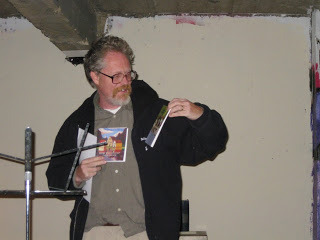
April 23, 2013
"The Kitchen Inside Me" by Blaster Al Ackerman
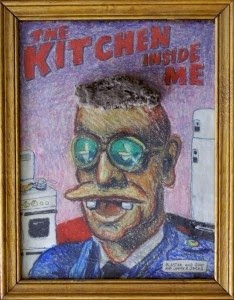
The tenth annual Transmodern Festival here in Baltimore starting on May 2nd is going to have up an art show of Blaster's work called "Blaster's Baltimore Years (1992 - 2010)".
Here be link to Transmodern:
Transmodern Festival
April 18, 2013
That Old Blaster Magic by Ian Nagoski
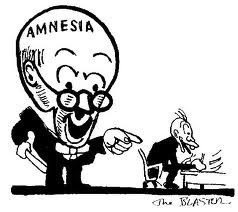
That Old Blaster Magic: I Remember Nothing, Unfortunately.
The first thing that those of us who knew Blaster will usually tell folks about him is how deeply he was committed to a unique vision of humanity. There’s a line in the intro to his Omnibus about his stories and images being populated with “ghoulish fools.” And there’s always something said by us acolytes about how incredibly funny he is, accompanied by descriptions of the tears, or, among his drinkier friends, pee lost in the process of enjoying his ohmygod harharlarious stuff . And then, at some point, there’s the earnest admission that after going down the rabbithole of his output, that the world looks different and that, although you can never really hope to be as good as him, that there’s been a successful seduction, and now you find yourself seeing with Blaster-colored glasses at times and feel proud when you feel that you’ve said or done anything vaguely Blasterish, usually in prosaic terms like, “he was such a huge influence on me.”
Since he’s been gone, I’ve been thinking about this little speech, the structure of it as I’ve heard it given and given it myself, and the ways in which I’m bound to hear it again in the inevitable celebrations of him in the months to come. There’s a lot I don’t know about how he transmitted to us because he operated as an anti-guru, teaching without teaching and studiously reckless about any sense of lineage. But because I was lucky enough to see him in his off-hours on a regular basis during a few years in the mid-00s when we were roommates in a one bed-room apartment (he had the back room and the alley entrance; I had the living room with the tiny kitchen and bathroom and his always-closed panel door between us), a few things do seem worth sharing out loud for the sake of celebration of the man he was and for comfort in the face of the grief that we feel for a friend and hero now gone. He was such a good pal and a great help to those of us who knew him.
Exhibit A: Dogs, Children, and the Creeps who Care for Them
I don’t know if it was ever published, but I recall Blaster reading at a Shattered Wig night a story in which he described himself as a one-man cheering section for the dogs he saw defecating on lawns around the neighborhood. The idea was that each time he saw some pooch taking care of business on a walk, Our Man would root him on with the encouraging proclamation that, “that boy’s moving his bowels pretty good!” And the thing was, he was just that kind of a booster for anyone he saw as innocent. Dogs and kids were alright with him, and he gave a lot of credit and warmth to people, although he was keenly discerning in the behaviors of the cast of characters that surrounded him. He stayed friends for ages with people whose behavior was unjustifiably chaotic or even dishonest, summing long-time friends up in moments of sad forgiveness simply by saying, “everyone knows he’s goofy,” or something equally diffusive of hostility or conflict. I mean that he was kind and compassionate, but I’m not saying he wasn’t clear about who was who. His shuddering revulsion at the simple presence of certain humans, characterized, for instance, with a summation that, “when that guy walks into the room, it feels like all the oxygen has just been sucked out,” made it clear that he’d been working all his life on a study of character. So, although he was never someone who shouted about anyone’s greatness much, if there was some laconic remark of approval or the opposite, you could believe it. I remember how he disliked seeing friends fall out, and while he and I had our ups and downs due to my chaotic behavior (while Blaster, meanwhile, was steady as a rock) the meanest thing he ever said to me, as I was on the precipice of some genuinely terrible decision was the sharp derision, “you FOOL!” Maybe he was capable of meaner words when he was younger or older, but during the time we were close, it was the worst insult I can imagine coming from him, and it saved me then from really fucking up.
Exhibit B: Endless Details of Tertiary Characters
If you ever talked with Blaster about books or movies, you’d notice that he rarely recommended anything unless he felt you were asking for it. He’d pass favorite recent reading and viewing along happily, but as a literary conversation progressed, that vastness of his knowledge became clear, startling, and intimidating. I once described a mutual aquaintance to him as being “like a character from a Russian novel,” to which he replied, genuinely annoyed by my indistinctness, “which novel?” And the truth is that if I’d named a book to him at that moment, he would have known just what I meant. He retained characters, in minute detail, in his memory banks from things he’d read once decades ago. I never heard him say, and can’t now imagine him saying, “I don’t remember.”
Exhibit C: A letter for a Letter
Because he self-promoted to the tune of deathlike silence, whenever I met someone who might benefit from his work, I asked him if it was alright if I passed his mailing address along. “Sure, baby,” came the inevitable reply. And as far as I know, he sent a postcard for a postcard and a letter for a letter to everyone who wrote to him. When I moved away, I got from him just as good as I gave and slightly - just slightly - more. (And goddammit, my greatest regret in our relationship was that I didn’t give more, partially because he deserved more from me and partially because of the chuckles and bafflement and fun I could have gotten in return.) I know it was that way with lots and lots of people.
Exhibit D: It’s a Loose Shoe
Often repeated, the advice to “Always Try to be Lucky Enough to Work in a Despised Medium,” was credited by Blaster to Frederic Brown from correspondence from Blaster’s youth. Blaster, of course, left little in terms of a paper trail that anyone could nail down and fucked around with who-did-what-when so much that Emily Fussleman’s Rabbit only knows whether Brown ever wrote any such thing, but it was a deeply sincere motto for Blaster. Freedom meant everything, and that meant sacrifice and self-attunement. Of the latter, I remember particularly a moment when arriving home one evening to find Blaster standing over the open, blue flame-peaks of the gas range with his hands held steadily a few inches from their tops. Peering into the otherwise dark kitchen, I quietly asked after his well-being, “Blaster? Are you cold, man?” Without moving his downturned palms, his gaze came dreamily toward me as he greeted with his traditional, “hey, baby.” As he moved his eyes back down to his spidery, white mitts and the quiet surrounding them, I tried again: “Y’alright?” “Yeah,” he said, “old Indian trick. If you feel like you’re getting sick, you hold your hands over a flame and focus on the warmth entering into them. I’m fine.” Meanwhile, evidence of years of deprivation overflowed in our kitchen around him. Anything he didn’t eat from any meal was retained assiduously for some unknown eventuality. Dozens of empty peanut butter jars eventually filled the cabinets, each with only bare scrapings inside. A few swallows of Coke stayed for months at the bottoms of plastic bottles, lined up like clay Chinese funerary sculptures in the fridge. The last two bites of any sandwich were carefully wrapped in tinfoil and stowed in the freezer until it was overflowing in graying, shiny packets of inedible crusts, and the top of the fridge was stacked in a tower of cardboard tubes from the insides of the tinfoil rolls. Eventually, I got the nerve to ask, “Blaster, how would you feel if I threw away those cardboard tubes or the peanut butter jars?” “Sure thing,” he replied, “you can do it. But I can’t. It’s no problem. I’m crazy, but I’m not THAT crazy.” Which is one of the most beautiful things I’ve ever heard anyone say.
(Once after I’d cleaned the kitchen and bathroom, Blaster was so alarmed that I got a full-on Redd Foxx about-to-have-a-heart-attack panic attack as he genuinely feared we’d been robbed of our grit and mold by bandits before I explained to him what I’d done. “What a homecoming! I’ve got to lie down!” He was fine an hour later.)
Exhibit E: What a Great Liar!
We were talking about possessions and moving once, and Blaster told me that once he’d helped a woman move and that among her effusion of stuff, he had carried a box labeled “Junior High School Sweaters.” I got a good laugh out of it. Years later, I met the woman in question, and told her smirkingly of Blaster’s divulsion of that intimate detail of her personal inventory. In no uncertain terms, she replied that she had never had any such box. It was clear that he’d made it up on the spot just to make a point and to make me laugh. Her name had simply worked in the moment as the character in the story he was creating.
On another occasion, I staggered into the apartment mid-afternoon after a catastrophically grim weekend-long date with a woman at my parents’ beach condo. Standing in the doorway of my room Blaster listened fixedly to me as I unwound the tale from my slumped position of a chair. My pathetic estrangement from this girlfriend came about gradually as I had repeatedly noticed gazing at me from behind a cloud of weed smoke with a terrified and puzzled expression. He retreated to his room, energized and poked his head back into my space a couple times to ask again about her facial expression. “Would you say that she had a look of suspicion and vague hysteria?” Yeah, I said. That’s about right. Later, “Would you say that she looked like a were-cat-badger-hawk?” I laughed. You know, she kind of did. The next day he, presented me with my own story, filtered through his own set of images and incongruities, titled “Hussrl” (who I was reading at the time) and, a blessing on his head, dedicated to me. (It wouldn’t surprise me if in a hundred years that dedication weren’t what I was best known for.) Blaster’s voluminous, voracious reading habit included bits of what he referred to as members of the “Poetry-Death Crowd,” in other words, the poetry establishment, the kinds of people who recognized in their own time as being Serious Poets for poignant images and downy styles. But he knew – KNEW – and showed by example that poetry is a behavior, a coping mechanism, and a way of being. It’s all of the playfulness and decent, kind fucking-around that you do because if you don’t, it all starts to feel like “nah.”
Hey, baby.
Sure, baby.
What’s happening, man?
How’s [that thing] going with [that person]?
Blaster’s voice in my head saying stuff like that are the core questions in every piece of work and every relationship I have undertaken since knowing him, just as much as:
Titans Be Pondering
Are You My Daddy?
Here Have a Peanut
You Are the Entity.
The Search for Puffy Treats
Why Did You Steal My Watch?
I Taught my Dog to Shoot a Gun
All Different All the Same
Or any of the other lugubrious gibberish that changed the world for me and my friends, feabs, floaters, and lurkers.
Whip it!
-----------------------------------------------------------------------------------------------------------
Sir Ian Nagoski is the record magnate behind Canary Records, a musician and a musicologist whose brain contains and retains a frightening amount of information. At times during his scholarly talks he may even perform an old Greek dance step or two.
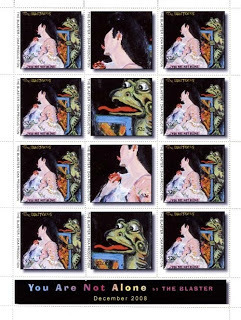
April 16, 2013
The Wild Hordes of Artichoke Wigs Host a Lit Carnival
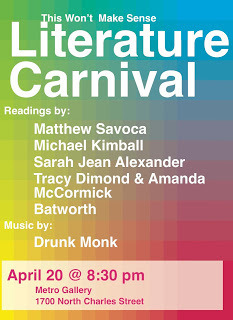
April 20th, this Saturday, at the Metro Gallery, the wild hordes of Artichoke Haircut literary outlaws will take a break from sophisticated dissipation and Baudelaire channeling long enough to host a lively Lit Carnival. We have thrown our longtime contributor and pal Batworth into the mix, plus there will be readings from Matthew Savoca who has a new novel out on Publishing Genius, Sarah Jean Alexander, Tracy Dimond and Amanda McCormick. Also, Michael Kimball will be hustling the rubes at a blackjack table and the group Drunk Monk will perform.
It starts at 8:30, which leaves you some time to spin some of your Record Store Day booty.
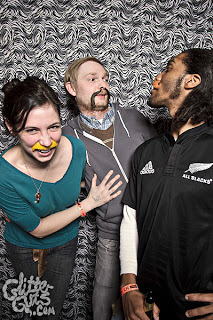
April 4, 2013
A Megan McShea Snowglobe Afternoon of March Splendor
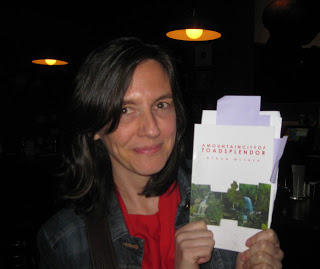
In a year of choking back tears praising golden fallen comrades at memorials, it felt comforting and promising that on this day we were gathered to toast a living friend and author who had a fresh book out "approaching greatness sideways like ants without eyes". This wondrous book is called A Mountain City of Toad Splendorand was published by Publishing Genius Press.

Being a lover of collaboration and experiment in the creative process - she was/is after all the headmistress of Miss McShea's Writing Workshop 3000 which was actually just a front for Blaster Al Ackerman to keep Megan's cat Sugar knee-deep in catnip - Megan had five of her writer comrades (this writer being one of the honored) on hand at the book release celebration to read one of their favorite pieces from the book and then write and read a response to it.
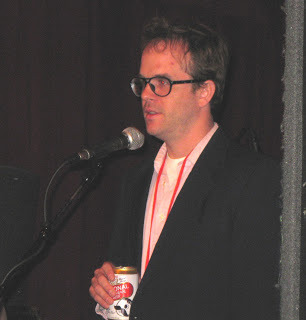
Above is Adam Robinson of Publishing Genius Press who with his exquisite taste in manuscripts to work with and ingenious innovative ways to present poetry as being as vital and necessary as your favorite music and as rewarding as spirituality brings the excitement of a pop cultural moment like the forming of Factory Records in the '70s to modern poetry of the 21st Century.
Adam in his introduction kicking off the day's festivities said that to him Megan's book is about pleasure. And indeed it's in the title of the collection's first piece "The Brain Is A Pleasure Organ" and it pops back up two pages later in the delightfully titled poem "11 Irritations That Morning". I am experiencing pleasure right now reading the simple zen-like burst of "Table Saw" that is sandwiched between those two. It goes:
Table
Table saw
Table saw bird
Table saw bird fly
Table saw bird fly out
Table saw bird fly out singing
And no one knows pleasure better than Adam R. That day he had just flown in from Florida where he had been swimming hours before and here he was back in Baltimore on a cold dark afternoon that would have been so gloomy without his publication of Megan's book and the party that that publication necessitated that Baltimore would have easily lost two or three more poets. In fact, Ryan Walker, who is actually from DC, said he had briefly considered closing his Volvo door on his nuts to remove them that morning before he remembered the McShea show. "Man, that's a rough way to go unless you're making a gender statement," I said. "Give me a running car in a closed garage." "No," said Walker, irritated, "not to off myself. To sing like my hero Neil Young. I have not been able to master his high notes."
Adam returned to us carrying Florida swimming water in his ears, though, and it caused him to have a kind of listing MC delivery like some pitchers throw a sidearm curveball. He also really had no idea what anyone was saying to him all day and just kept mumbling "yeh, doogle". Critics for decades will debate the impact of the earwater on his performance and even break into two camps - those who thought it was pool water and those who surmised ocean swimming was more likely Robinson's m.o.
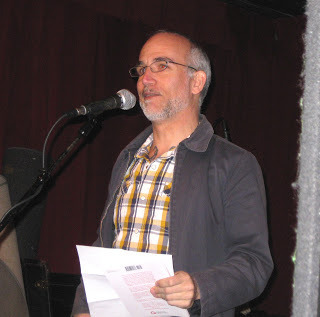
It was extremely kind of Daniel Day Lewis, above, an old high school acquaintance of Megan's to make an appearance, but he completely ignored the rules of the reading and just re-read his recent Oscar acceptance speech.
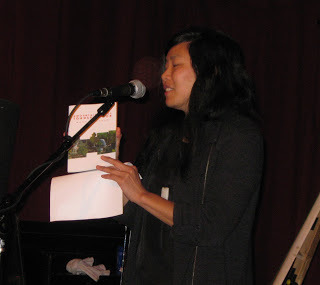
Above is poet and performance artist/musician Bonnie Jones. I love this picture because it seems she is singing an incredibly lovely version of a ballad or something.
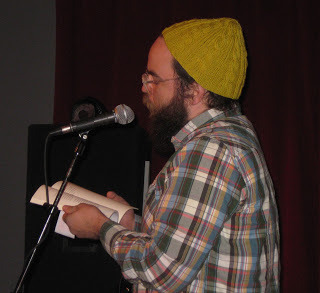
Worms avatar Bob O'Brien always hungrily and masterfully launches into a mic like an HBO sex scene.
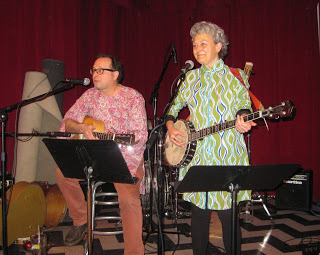
This was The Mole Suit Choir's second gig and our first with mics and psychedelic threads from Ruth Turner's fantastic shop Caravanserai. We had two new songs in addition to our set opening for Daniel Higgs. One was Chris Toll's poem "Why Is If in Life" musicized by Liz and the other was a Liz treatment of my poem "The Heart Is a Rage of Afflictions".
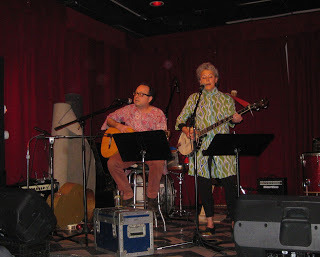
After Mole Suit had their say, Megan took the stage to enthusiastic applause and cheering from the packed Windup Space crowd - damned impressive, especially for a Sunday afternoon. "Right now the introvert me is battling the narcissist part of me," Megan modestly said. "Narcissist part, narcissist part," someone (I think Lauren Bender) in the crowd answered.
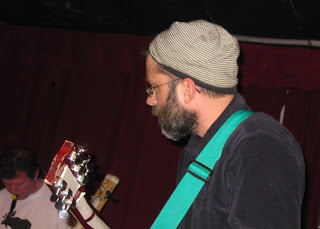
After Megan finished with an encore the raw fiery Electric Junk Band dropped some fine meat into the day's savory gumbo.
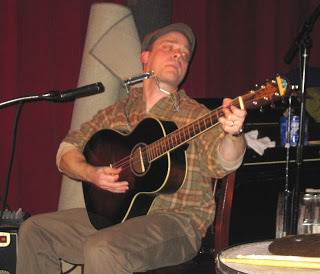
Here Madame Liz relaxes after Mole duties. Have I mentioned yet that singing with her is like having champagne pumped through your soul?
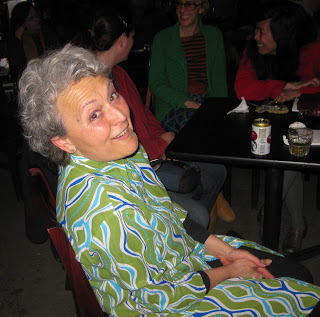
"I like Megan, she is a good poet. it's sort of the deepest kind of poetry. Not about anything in particular, just about life and how we don't understand it and also how we do understand it." Were these wise words spoken by the gent seen below sprawled on the couch like he has just put a call in for Brandy of Patapsco Ave. and a wand of blow? No, they were spoken by Megan's young second cousin Max, a wee lad of 9, after attending the Day of Toad Splendor. A lad so precocious that when his parents asked him a few years back what they should call his upcoming little brother, he answered "Highwalls".
It is the magic linguistic mystery of how a five or six year old would summon a name like that makes life interesting and it abounds in Megan's book, "a toffee, a tart, a perfect bedlam".
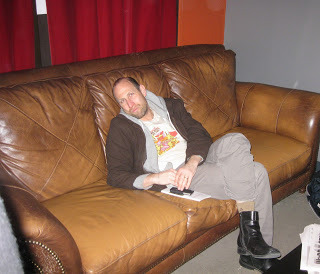
March 29, 2013
An Appointment With Dr. Feebnuts for Blaster Al Ackerman
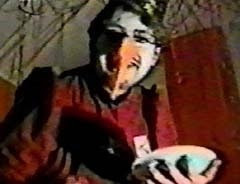
It's near 3am after the first Shattered Wig Night after Blaster slipping through the time crack. I've been cobbling together this tawdry little homage using bits of his bits.
Well Dr. Feebnuts
I didn't have these
lumps when I entered
your office
but here they are
with so many
heads mewling sweetly
mewling at the body with bop cap
morning beers
of word clattering glory
the horded pork
loins of droopy drawers Jim
a big bummer
Hey sailor, there's
a pumpkin in Uranus
There is a sun behind our sun
A moon behind our moon
and the puppet strings
have crossed forcing my
hand onto your leg
Here is the alley where
you took a blackjack
to the face for me
Here are the Clover eggs
fried with hangover leaden lids
still sliding on the sweat-sheened
ratty couch
I am not Lulu
and you were not Sidney Poitier
but if you wanted the moon
I would write across the stars
The Moonhead News
- that news being that
you cracked my mind
revealed my past to me
like a turd shimmering
on the end of a fork
but with promises
of comets blazing ahead
And how should I thank you
for that and the Thai meals
and Emmylou fried chicken
I will never know
but I will place
you in the wrinkled
McDonald's bag of my heart
jammed under the seat of
a pickup truck
Sadly Dr. Feebnuts, my
current insurance won't
cover a mind blowing, a
near deadly glimpse into
The True Reality
but I will use the
one last bit of advice
from my old pal Blaster -
If the bill collectors are
calling, always answer your
phone "Juan's Taco Palace!"
- Rupert Wondolowski
Blaster Al Ackerman: An Obituary, from Reviewiera
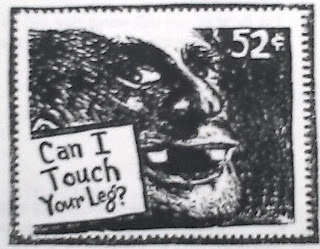
Blaster Al Ackerman: An Obituary
"Book in hand, I began to creep toward him. 'Wanna see something pretty?' I called softly."
[from "The Puffin Book", in Corn & Smoke: stories, performances, things, Shattered Wig Press, 2006.]
It started somewhere in 1994, I think. Out of school, working the kinds of jobs a pillow-soft high school graduate can get, ping-ponging between passed out on the curb, puking out the window, and white-knuckle sobriety. I was, obviously, the kind of adolescent who had as a constituative part of his self-identity something called 'being a poet'.
Part of this meant writing poems, and sending them off, to try to validate myself through publication. Being a corn dog in Denver, essentially completely without any connection whatsoever to culture, finding places to send my mediocre efforts to was a DIY affair. I had to buy Factsheet Five or The Poet's Market and work only thus dimly illuminated, with SASE and cover letter and three to five selected pieces, over and over again. (First thing you learn is you always got to buy an issue before you submit.) They list the editors in The Poet's Market, so your cover letter can sound professional—or whatever the analogue for professionalism is in the deliberately self-marginalizing, endlessly self-regarding, pseudo-mystical world of poetry. When I started submitting things to the Shattered Wig Review, their listed editor was Fred Engels. I didn't get it. I failed the test.
I wrote a couple letters to Fred Engels—I bought issues, I submitted stuff. And, page by page, issue by issue, the Wig changed my life. Mainly by way of regular and large doses of the writing of "Blaster" Al Ackerman. Weird little poems—often with faint, unplaceable whiffs of something irretrievably sad—hilarious and nightmarish stories, brilliant and unsettling cartoons. I started chasing him through the small press underground.
You Hear That
you were giving me a ride someplace
that didn't pan out, the movies I think
but that closet's too dribbly to go to the movie
you hear that
Words mean nothing to such a game of wetness and
that's why cats faint as they learn who made us
if not he who made the big purple heads
is like a wet dream of thought now willed
that can make a new being made of elements
which cannot be identified, only spent.
You hear that?
Words mean nothing to such a thing
These transitional expressions really can not be real
Now it seems to have disappeared
No, wait. It seems to be coming back again, a little
But it's becoming broken like a fruitcake
It's dreaming all the while like the blackness of sleep
But what is this? You say sleep is black as night
And yet it seems possessed by nothing but imagination
That is the way sleep goes and we are a lot like Dryden
We cannot be correct
We haven't time
[from JMB]
The most reliable source for the Blaster Al I liked best was John M. Bennett's Lost and Found Times, where Ackerman regularly had a few pages to detail his methodical and playful poem-making practices: "Ack's Hacks". One month he might take a John M. Bennett piece and a Steven Spender piece, rip each down the middle, and splice them together, left halves by Bennett, right halves by Spender. Another month he'd use what I remember he called the "World of Wastebasket": wad up and partially smooth out somebody's poem, and use the words you can see as a word bank for your own poem.
I adored the results, with their roiling mix of perspectives and rhythms, their weird, unpredictable lexical combinations—and a kind of surrealism that went ineffably deeper than unusual image-juxtaposition or unexpected placement—their humor and sadness. I also adored the window into their creation, the frank joy and attention to detail, the constant demonstration that "being a poet" is always dumped and trumped by "working to write a poem". Issue after issue of Shattered Wig Review and Lost and Found Times—and others!—taught by example that "inspiration" is nothing at all, that the poet-persona never matters as against an ass in a chair, doing the work, that doing the work was best done with humor and honesty as the watchwords, tempering the arrogance of making something with the humility in admitting where it came from and the determination to make it as good—and as well—as possible.
I found pretty much the whole world in these poems and stories. There was ugliness, horror, and immense confusion; weird rhythms of recurrence; humor that lacerated and healed by turns; references to genre from romance to hard-boiled to science fiction to newsletter to shaggy-dog story to rambling guy in a bar. Maybe sometime somewhere somebody will top The Crab as an exemplar of the personal essay; I'm not holding my breath. Sense was not always on display on the surface—perhaps the Doctor's most notable concession to consensus reality (and certainly his deepest subversion of same; one of the most consistent pleasures in this intensely pleasurable work is the slippage between name and thing and thing and thing—half his narrators spend half their time asking, and needing to ask, and not really getting straight answers to, questions like:
"Do you mean a bat like in baseball or like in 'any of numerous flying mammals of the order Chiroptera, having membranous wings and navigating by night by echolocation?'"2
2 I won't leave you hanging. The answer: "I mean 'bat' as in Batman or Devil Bat."
[from] "The White Bat" (widely reprinted)).
Somewhere Ackerman noted1:
so much of what I do is gibberish, but looking at the world, it's hard to say that gibberish isn't the central art form of our time
"Sideshow Days with Your Pop"
[from: Shattered Wig Review 18, Summer, 1999.]
When I found Feh! Press' brilliant Omnibus, the lessons only amplified, clarified, purified. Blaster introduced one piece with this:1
These are words scribbled hastily in the margins of a life, by a man too often taken in drink, some written sitting behind the wheel of a car, waiting for someone to finish their physical therapy appointment
1 This quote is from memory. Forgive my citational incompetence, please: I write these words without access to my full library.
This, then, was how to go about writing. His treatise on the "Tacky Little Pamphlet" was how to go about distributing that writing: you'd write some stuff, you'd stuff it all onto some papers, you'd leave them around, in magazine racks, or at the laundromat, or stuffed into envelopes and mailed to random addresses. This I did.
"Stamp: Can I Touch Your Leg?"
[from: Shattered Wig Review 18, Summer, 1999.]
Eventually, I sent a thing or two to Blaster Al himself. He always write back—his grand scrawl "Get This to:" on the envelope, usually a hand-drawn stamp: there was never any mistaking an envelope from Blaster Al Ackerman. I lost all this correspondence moves and moves ago, I think, but I have retained the kindness and generosity he showed to a nobody from nowhere, some dumb kid just trying to figure out how and what and why to write. He once sent a draft version of an as-then-unpublished story called "Floaters". It was so good, and meant so much to me, that I carried it through six weeks of travelling, Portland to Rome to Barcelona to London to NYC to Georgia to Chicago to Austin to Denver to Portland, nothing but a backpack and not much room for books.
C.S. shifts around in the golf cart, trying to ease his legs. How can there be so many strange and unexplained things in the world, he has no idea. Recently, he has read an article in Playboy about men who are turned on by wearing lobster claws and watching boa constrictors swallow alarm clocks. They are called Dadaists.[from] "Floaters"
The good Doctor died last week sometime. I found out on Twitter. The link was to this, excellent, remembrance: Dear Blaster. Among the regrets this instanced: I had written him in years. I had not bothered to write this appreciation.
Al Ackerman was a great man. His work was varied and brilliant, and anyone free of dogmas about the inferiority of humor or prejudices about underground writing will find a lot to learn from, and laugh at, and linger over. If you care more about what he nice, I can assure you he was. There is much evidence on this point, and it all agrees with me. The evidence of his genius is even more abundant. Shattered Wig Review Catalog Direct links to Blaster Al publications Lost and Found Times
His democratic willingness to engage with just about anybody isn't there, anymore—but if a legitimate titan of underground writing could take time from his medical transportation gig to answer his mail, so can you...and so can I. Good things may come of it!
Back in front of my building, three men were out on the stoop—two of them were having a beer-pissing contest, the third was refereeing from the top step. The referee, I saw, was gross old Mr. Barsh, the building super, who never fixes anything.
Book in hand, I began to creep toward him. "Wanna see something pretty?" I called softly.
[from "The Puffin Book", in Corn & Smoke: stories, performances, things, Shattered Wig Press, 2006.]
In between work and mail and life, and fighting for what dignity and decency we can manage, we can write, or draw, or sing, or otherwise make stuff. Blaster Al did.
I want to close with a couple long sections from my favorite Blaster Al chapbook. They include the powerful repetitions, the humor, the sadness, the horror, the confusion I associate with the best of his work. It's the whole world, in other words—the best words: the words of Al Ackerman. The world is a poorer place without him.
--Fat
[from: Let Me Eat Massive Pieces of Clay, Shattered Wig Press, 1992.]
from DEATH DEAT DEPARTURE
Are you sick? drunk?
Well it's good to know that for a few days
Voices come alternately from both sides
Though under normal circumstances the saying that never comes true
Starts to smell after a few years--so that each day, after that, was
akin to a large doll's face burping outside the window
Whew: that face was the size of a parking lot, and all onions, near which stood a man named Canarse Park
Now forget that
Congratulations!
That was no church! That was rodomontade,
Or the moss-hell "false memory"
Of lofting the teeming BALTIC AVENUE DRUGSTORE
To relocate it more nearly above locations that never change when
Proofs of dark, roam and percolate
Nourishing the urge to understand bur not hear about any
Plans to overrun or swarm about in large numbers but still, in the shredded-silver
REFLECTION that goes tearing along overhead
Topped with a drawing (chedderchrome) of mayonnaise congealing on
The lip of the drinking glass the Coca Cola and Jim Beam is in:
It was ten-of-seven
When Hawk realized he
Was unshaven and
Driving a van he had
Never seen toward
UNREALIZED POTENTIAL MORE FULLY UNREALIZED
.......................................................................
Now forget that
March 28, 2013
The Truth Can Now Be Told by tENTATIVELY a cONVENIENCE
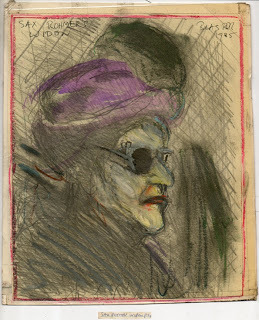
("Sax Rohmer's Widow" by Blaster and collage below from tENT's archive)
Blaster Al In The Cosmos Tribute Week continues with a submission from booed usician, filmmaker, author, mad scientist, archivist tENTATIVELY a cONVENIENCE, known to some alley denizens in the area of Normal's Books as "Mr. Zipper Man".
tENT was also my conduit to the enchanted forest of Blaster's art and mind. We worked together at Second Story Books and tENT showed me copies of Popular Reality and John M. Bennett's epic long running visionary literary magazine Lost and Found Times, two of Blaster's main vision portals of that time (Lost and Found Times for decades and Popular Reality went on to publish the Monster On The Bookshelf - The Blaster Omnibus.f
The truth can now be told. We are almost all dead now. I am the only one left alive. The 6 Finger Club sent circulars from Belfast to San Antonio to Tepoztlan to BalTimOre to San Leandro. Lafferty is dead, Zack is dead, Blaster is dead. The stench of sulphur that hung about us has been sanitized by the shrunken hebephrenic cardboard pine tree. We all opted out: live fast, die old.. but DIE, baby, DIE. We are all dead now, except for maybe DJ.. & Nunzio.. & False Kitty.. Blaster began by breaking things that morning. He broke the glass of water on his night stand. He knocked it crazily against the opposite wall and shattered it. Yet it shattered slowly. Even I am dead.. & if you were to ask my why I'd tell you that story, the one you've heard more times than you can remember. In fact you can't remember it at all & that's why I keep my shaving cream next to the bust of Blaster. Wch is a flat screen tv. I am tENTATIVELY, a cONVENIENCE & I am a hebephrenic. Oh, sorry, wrong meeting. Blaster's bust is flat. In fact, Blaster's bust IS that pine tree, that pine tree he planted that thyme, most commonly Thymus vulgaris. Fact is, the world's a flatter place w/o Blaster. The Flat Earth Society was right. Marshall B. Gardner was right, contradictory as that may seem. If Blaster were still here he'd have a bicycle pump attached to that sucker in no time flat & Pego & Rupe wd be plunging it up & down like a dynamite - w/ Blaster & that fucking pillowcase & Mogen-David cackling like a hen w/ a Johnny Cash brain implant. & the world wd be a safer place for it.
tENTATIVELY a cONVENIENCE
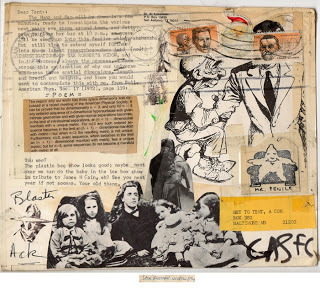
March 26, 2013
The Eternal Network
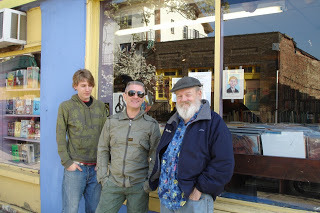
Dr. Blaster Al Ackerman 1939-2013
Love to you now in the eternal network!
Outside Normals Bookstore 2007
In the kitchen door like so many morning glory seeds
in your stomach golden and queasy wrapped up in
cellophane smelling of pine, deer park, old pulp
envelopes and centrefold yellow hacks who dream on
35c a word for truth and eerie goings on in the 'other
room'....
Andre Stitt
March 22, 2013
The Incomparable Amanda Pollock On The Incomparable Blaster Al
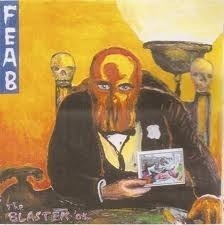
Blaster
You had moved in to Normals and seemed to like it.
Who was this new denizen of the murky book nook?
Rupert quaked and burbled in your presence, which made me wanna
Quake and burble too.
Soon after first meeting you… I would don the wretched yellow
Bathing suit and drag you around town for a night or two…
Or was it a week in that fucking thing?
You said the strangest things in the night that I could never quite remember... but you were quite serious
With the beer drinking quietude in the daytime.
And that always made me feel unsure… which turns out is
Something I thrive on.
Ca- Rack o Canned Beer! o yeah from the corner… and a swift Quay sashay…
You had a chair there… but I could swear it was a fucking merkahbah
You had access to… I was convinced you were an honest
To god time traveler. I liked that you liked beer how I liked beer.
Then one day I decided to pack up and leave... Rupert bought all my books which would end up being what I had to move away with. We had going away party… I heard that someone was getting a champagne enema in the basement and I wanted to go and look but you stopped me and you gave me One of your pastel 8 by 10 drawings… I think it was a self-portrait of you barely held inside a red Bathrobe… the NYC skyline in the background and the words… "Welcome to New York" were written in black oily scrawl. All the hair on the exposed body looked like gray ramen… how’d you do that? Shoo.
I seen done been so many fucking things since way back then… and from my travels I have very little left to show…. but that I held onto and still can admire. When I look at it… I remember all of us… fearlessly fucked up and all friends and friendly. Last time I saw you… you had yer soap in mouth maw a flappin… and out of the sudsy garbled sides flew your one of kind poetry. I knew it that first day I laid eyes on ya and also the last day… I was lucky… we were lucky when you decided to move into Normals.
- Amanda Pollock
---------------------------------------------------------------------------------------------------------
Amanda Pollock is a singer songwriter, author, former nurse and undeniable force of nature. In the haze and fuzz of '90s Baltimore she was a member of the musical assault circus troupe Cloaca.
